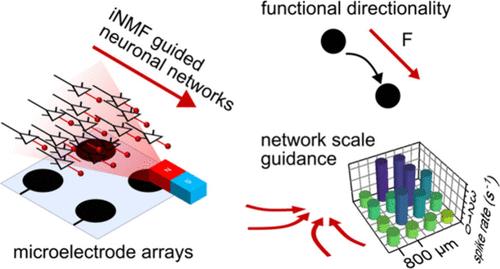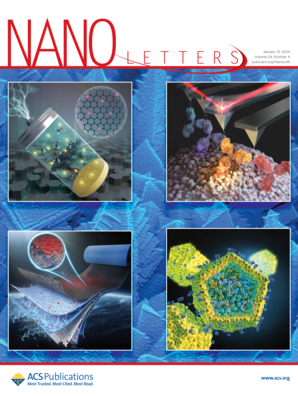纳米磁导向塑造发育中皮质网络的结构-功能关系
IF 9.6
1区 材料科学
Q1 CHEMISTRY, MULTIDISCIPLINARY
引用次数: 0
摘要
在这项研究中,我们对皮质神经元实施了大规模纳米磁引导,以引导发育过程中分离的神经元网络。在微电极阵列上培养的皮层网络暴露于功能化的磁性纳米粒子,然后在体外暴露于磁场以引导神经元14天。轴突蛋白 Tau 的免疫荧光显示,与非引导网络相比,更多的神经元在纳米磁力的作用下变长并对齐。在发育过程中,微电极阵列上的明视野成像进一步证实了这一点。自发电生理记录显示,通过格兰杰因果关系(Granger Causality)确定的力对齐连接中,引导网络的发射率和频率都有所提高。在具有不均匀力方向的网络中应用这种方法,会增加目标区域(即纳米磁力方向上的区域)的局部活动。总之,这些结果表明,纳米磁力能在毫米尺度上引导分离的皮层神经元网络的结构和功能。本文章由计算机程序翻译,如有差异,请以英文原文为准。

Nanomagnetic Guidance Shapes the Structure–Function Relationship of Developing Cortical Networks
In this study, we implement large-scale nanomagnetic guidance on cortical neurons to guide dissociated neuronal networks during development. Cortical networks cultured over microelectrode arrays were exposed to functionalized magnetic nanoparticles, followed by magnetic field exposure to guide neurites over 14 days in vitro. Immunofluorescence of the axonal protein Tau revealed a greater number of neurites that were longer and aligned with the nanomagnetic force relative to nonguided networks. This was further confirmed through brightfield imaging on the microelectrode arrays during development. Spontaneous electrophysiological recordings revealed that the guided networks exhibited increased firing rates and frequency in force-aligned connectivity identified through Granger Causality. Applying this methodology across networks with nonuniform force directions increased local activity in target regions, identified as regions in the direction of the nanomagnetic force. Altogether, these results demonstrate that nanomagnetic forces guide the structure and function of dissociated cortical neuron networks at the millimeter scale.
求助全文
通过发布文献求助,成功后即可免费获取论文全文。
去求助
来源期刊

Nano Letters
工程技术-材料科学:综合
CiteScore
16.80
自引率
2.80%
发文量
1182
审稿时长
1.4 months
期刊介绍:
Nano Letters serves as a dynamic platform for promptly disseminating original results in fundamental, applied, and emerging research across all facets of nanoscience and nanotechnology. A pivotal criterion for inclusion within Nano Letters is the convergence of at least two different areas or disciplines, ensuring a rich interdisciplinary scope. The journal is dedicated to fostering exploration in diverse areas, including:
- Experimental and theoretical findings on physical, chemical, and biological phenomena at the nanoscale
- Synthesis, characterization, and processing of organic, inorganic, polymer, and hybrid nanomaterials through physical, chemical, and biological methodologies
- Modeling and simulation of synthetic, assembly, and interaction processes
- Realization of integrated nanostructures and nano-engineered devices exhibiting advanced performance
- Applications of nanoscale materials in living and environmental systems
Nano Letters is committed to advancing and showcasing groundbreaking research that intersects various domains, fostering innovation and collaboration in the ever-evolving field of nanoscience and nanotechnology.
 求助内容:
求助内容: 应助结果提醒方式:
应助结果提醒方式:


